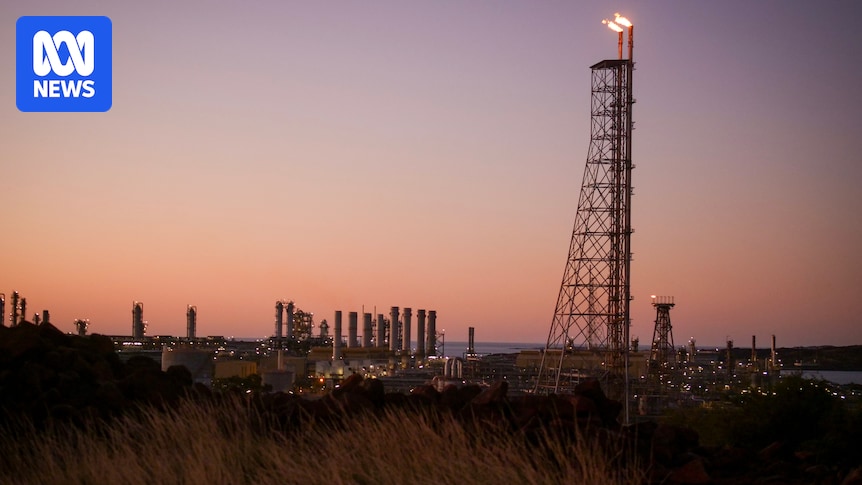When the nation’s largest mainland gas project was given provisional approval to keep running until 2070, the West Australian premier heralded it as an economic boost for the state.
“It’s not just important for our overall economy, it’s important for regional WA,” Roger Cook told reporters.
But the most recent state budget papers show the shared revenue, or royalties, the project is generating for WA is in rapid decline.
A royalty is a fee charged for the right to extract a mineral resource.
In the 2022-’23 financial year, royalties from the North West Shelf (NWS) gas project on WA’s north-west coast, delivered more than $1.3 billion to the state’s coffers.
That number is now tipped to drop by more than 70 per cent to $365 million in the 2025-’26 financial year.
That amounts to 0.7 per cent of the state’s $50.2 billion revenue, and just 6 per cent of the $6.6 billion generated by iron ore royalties.
Declining gas fields
The drop in revenue is because the project’s original gas fields are depleting.
When the NWS began production in 1984, it was required to give 10 per cent of the revenue from each gas well to the Commonwealth.
A legal change four years later meant future offshore projects would not pay royalties, but a 40 per cent tax on profits, known as the Petroleum Resource Rent Tax (PRRT).
Two-thirds of the revenue from the NWS is redirected to WA.
But as those gas fields deplete, so does their revenue, and there have been new gas sources processed at the NWS since 1988 that do not generate royalties.
“The North-West Shelf project [is] forecast to process higher volumes of gas sourced from areas outside the revenue-sharing agreement,” the 2025-’26 state budget papers read.
Principal adviser to progressive think-tank The Australia Institute Mark Ogge said he had not seen any evidence the new gas sources required to extend the NWS would have royalty agreements attached to them.
Mark Ogge has long argued the country does not get a fair return on the large volumes of gas it exports overseas. (ABC News: Peter Drought)
“Australia is being robbed of its resources and our governments are entirely complicit,” he said.
Mr Ogge said West Australians reading the latest budget should be outraged.
Revenue tipped to bounce back
Oil and gas analyst and consultant Jeanette Roberts believed it was likely new revenue-sharing agreements would be signed if the NWS extension was finalised.
“I think that’s the most likely scenario,” Ms Roberts said.
A spokesperson for Environment Minister Murray Watt would not comment on whether royalties had featured in the negotiations over the NWS extension because the decision was not final yet.
Ms Roberts pointed said the oil and gas industry made other contributions to the Australian economy through taxes.
“Tax is more than just Petroleum Resource Rent Tax and state royalties, it’s also GST, corporate taxes, a whole bunch of contributions gas companies pay,” she said.
The industry’s peak lobby group, Australian Energy Producers, claimed the sector paid $17 billion in taxes and royalties nationally in the 2023-’24 financial year.
Woodside says the North West Shelf has generated $40 billion in royalties since the 1980s. (ABC News: Charlie Mclean)
A spokesperson for Woodside, which manages the NWS, said the project had contributed $40 billion to Australia since beginning production in 1984.
“Including more than $18 billion to the WA government,” the spokesperson said.
They would not comment on any future royalty-sharing agreements.
According to the Australian Taxation Office’s corporate tax transparency report, the company paid $2.6 billion in income tax in the 2022-’23 financial year.
Calls for more royalty agreements
Mr Ogge from the Australia Institute said the public should still expect more from the industry given there were large offshore gas fields near WA where royalties were not being charged.
“Vast amounts of gas are processed in Western Australia from offshore fields and exported, making tens of billions of dollars every year for these companies,” he said.
“I just cannot understand why the federal government doesn’t charge royalties on the vast majority of gas being exported from Western Australia.”
Treasurer Jim Chalmers was approached for comment but did not directly respond to questions.
Last year, the federal government made changes to the PRRT, which it claims has brought in more tax revenue from the oil and gas sector.
